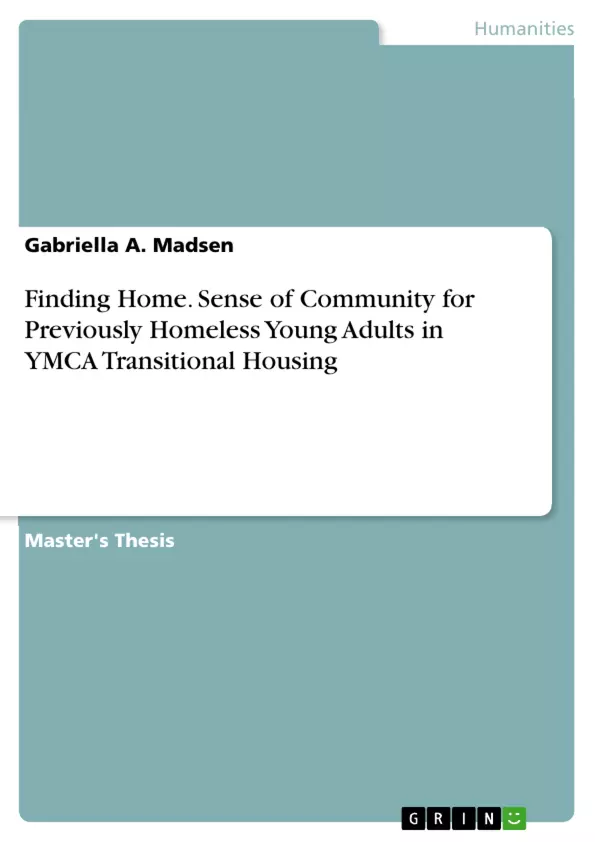Homeless young adults represent a failure of the U.S. social services system to prevent new generations of homeless people. However, several organizations are working in concert with communities and governments to combat this problem through transitional housing programs that target young adults ages 18 to 24. Many of these programs mirror the new urban development trend of mixed-income housing, and place transitional houses inside stable neighborhoods that are either affluent or mixed-income themselves. While these programs represent monumental commitments in terms of resources, they also represent hope for many young adults. The sense of community these young-adult residents feel toward their neighborhoods and programs have lasting effects on the residents’ abilities to find normalcy inside the American culture through access to education, safety, and employment. This study examines the YMCA Young Adult Services Program for transitional housing, exploring how the program works and what is residents’ psychological sense of community.
Inhaltsverzeichnis (Table of Contents)
- Author's Note
- Abstract
- Introduction
- Liberation Theology and Empowerment
- Limitations
- Methods
- Vocabulary
- Interviews
- ZIP Codes, Census Tracts & Housing Location
- Mixed-Income Neighborhoods in Chicago
- YMCA Young Adult Services
- Structure of Young Adult Services
- Model of Involvement
- ZIP Codes, Census Tracts & Housing Location
- Story of Sue
- Results
- Conclusions
- Recommendations
- References
- Endnotes
- Appendices
- Appendix I: young Adult Resident Survey
- Appendix II: Resident Manager Email Interview Questions
- Appendix III: Subject Pseudo-names
- Appendix IV: Answers to Resident Survey Subjective Questions
- Figure 1: Structure of YMCA YAS
- Figure 2: YMCA YAS Model of Involvement
Zielsetzung und Themenschwerpunkte (Objectives and Key Themes)
This thesis investigates the development of a sense of community among previously homeless young adults residing in YMCA transitional housing. It aims to understand the factors that contribute to or hinder the formation of community within this specific context. The study utilizes qualitative research methods, including interviews and surveys, to explore the lived experiences of the participants and to identify key themes that shape their perceptions of community.
- The impact of homelessness on the development of a sense of community.
- The role of YMCA transitional housing in fostering community among residents.
- The influence of social and economic factors on community building.
- The importance of individual agency and empowerment in creating a sense of belonging.
- The challenges and opportunities associated with building community in transitional housing settings.
Zusammenfassung der Kapitel (Chapter Summaries)
- The introduction provides an overview of the study's purpose, methodology, and significance. It also introduces the theoretical framework of liberation theology and empowerment, which informs the research.
- This chapter explores the limitations of the study, acknowledging potential biases and constraints that may influence the findings.
- The methods chapter details the research approaches used, including interview techniques, survey design, and data analysis methods.
- This chapter defines key terms used in the study, including vocabulary related to homelessness, transitional housing, and community building.
- The chapter presents the structure of the YMCA Young Adult Services program and its model of involvement. It examines how the program aims to support young adults transitioning out of homelessness.
- This chapter presents the results of the data analysis, highlighting key themes and patterns that emerged from the interviews and surveys.
Schlüsselwörter (Keywords)
The study focuses on the keywords: homelessness, transitional housing, YMCA, community, sense of belonging, empowerment, social justice, qualitative research, mixed-income neighborhoods, Chicago. These terms encapsulate the core themes and concepts explored in the research.
Frequently Asked Questions
What is the focus of the YMCA Young Adult Services Program?
The program provides transitional housing and support for formerly homeless young adults aged 18 to 24, aiming to help them find normalcy through education, safety, and employment.
What is "Psychological Sense of Community" (PSOC)?
PSOC refers to the feeling of belonging and importance that residents have toward their neighborhood and the support programs they are part of.
Why does the study mention mixed-income housing?
Many transitional housing programs place residents in stable, affluent, or mixed-income neighborhoods to provide a safer environment and better access to resources.
What theoretical framework does the study use?
The research is informed by the concepts of Liberation Theology and Empowerment, focusing on how individuals can gain agency over their lives.
Where was this study conducted?
The study focuses on the YMCA Young Adult Services program operating in Chicago.
- Quote paper
- Gabriella A. Madsen (Author), 2013, Finding Home. Sense of Community for Previously Homeless Young Adults in YMCA Transitional Housing, Munich, GRIN Verlag, https://www.grin.com/document/315488



